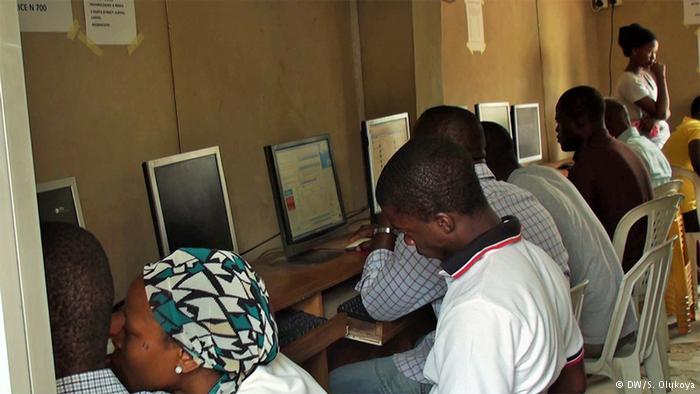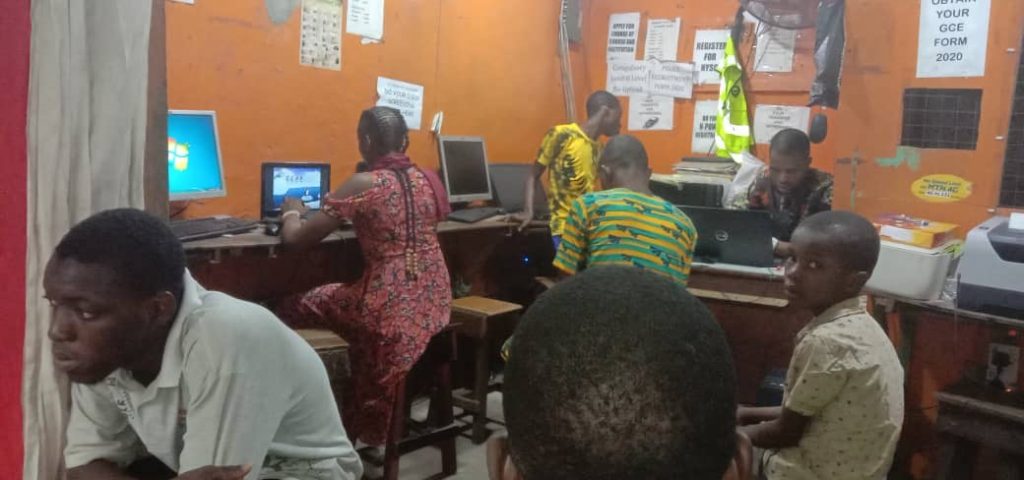Internet was officially launched in Nigeria in the late 1990s. But it wasn’t until the early 2000’s that the business of cybercafe exploded with the proliferation of cybercafes in urban areas across the country. In Lagos for instance, almost every major street and bus stop had a cybercafe, usually nestled on one of the floors of the many business plazas dotting the city.
I remember this era very well because my first ever email, marijata2003 was a testament to it. It was the norm at the time to see emails bearing the years they were created. folasade2001, ugochime2004 etc.
Back then, the luxury of being creative with an email address was totally overshadowed by the excitement of owning and exploring your own personal inbox for the very first time. So we just stuck the year to our (nick)names and got the registration process over with.


Cybercafes continued to be lucrative around residential areas, business areas and areas of higher learning until around 2015 when Nigerians stopped seeing personal computers and smartphones as luxuries but rather as necessities that ought to be personalised. This realisation drove more and more people to invest in these ICT gadgets, especially smartphones.
In Q1 2015, smartphone shipment into Nigeria witnessed a whopping 135% Year-on-Year growth. While PC shipment wasn’t as impressive, there was nonetheless an impressive 1.9% growth in the 2014/2015 figures.
Nothing lasts forever. Not even the sun. And so it was that the once flourishing industry of cybercafes began to experience a steady decline as mega cybercafe’s morphed into other businesses while smaller ones simply died off. Nowadays, they have become a rarity. Except in low-income areas.
Little more than business centres
Going through the streets of low-income areas, it isn’t hard to see that most of the cybercafes still in existence have become little more than business centres. Some have even diversified into providing other services like logistics, eateries, video game plazas and even football viewing centres, making them cafes in the real sense of the word.
Andy a former cybercafe owner in Ebute Meta area of Lagos told me that with a good location, former cybercafes could be turned to basically anything else.
“The most important thing is having a good location. I saw that my location was good so once cyber cafe stopped being lucrative, I switched to the confectionery and creamery business.”
Andy
“Now the place is mainly a relaxation spot where people can sit in, order for ice cream, meatpie and others. I also offer business services like printing and photocopying but the truth is, even that doesn’t pay anymore,” he added.
The reasons why cybercafes stopped being lucrative are quite clear. The proliferation of ICT gadgets like laptops and smartphones and the crashing price of data services meant information was readily accessible at our fingertips.
But no matter how common these facilities have become, they remain little less than luxuries reserved for people who could afford them. With 40.1% of Nigerians living below the poverty line of N137,000 (roughly 361 U.S. dollars) per year, smartphones, laptops, the internet and other ICT gadgets like printers, scanners, etc remain a prerogative of medium/high income earners.


This leaves the poor, which constitute a greater percentage of the population, desperately lacking in this regard. It is, therefore, no wonder that cybercafes still thrive in low-income areas.
Lekan a cybercafe operator in Badia-Ijora said the reason why he’s still in business is because of the poverty around him.
“These people, they can’t buy printer in their house so if they want to print they must come here. Many of them don’t even have good android phones so they can’t open some sites or some documents.
Lekan
“They also can’t afford internet. Some of them do N200 a week subscription on their phones. They know that if they mistakenly open a web page on their phone, their mb (data) will finish. That’s why they come here, buy 1 hour for N100 and use it as they like,” he said.
With national examinations like WAEC and UTME now requiring online registrations and computer-based exams, cybercafes like Lekan’s that refused to die are reaping the benefits of it.
Over 1.6 million candidates registered for the 2019 Unified Tertiary Matriculations Examination (UTME). The figure rose to 1.9 million in 2020, indicating a whopping 16% growth.
“Many of our customers are young people registering for JAMB and GCE,” Lekan said. “As many of them don’t have PC at home, we help them register and follow up. We also have CBT test program so that they can pay and practice how to successfully write CBT exam. That’s where we see our money.”


While Lekan might be eking out a living by scavenging the carcass of the dying cybercafe culture in Nigeria, Andy thinks it’s just a matter of time before there’s really nothing to scavenge anymore.
According to him, printers are becoming obsolete or at best, pieces of equipment that does more in making the office look more official than actually supporting any kind of efficiency and productivity.
“People who still run full cybercafe business are living on borrowed time,” he said. “Nowadays people don’t even need printers much because a document in soft copy is more easily accessible anywhere and anytime. Go to offices, some people don’t touch printers for days. It is just there to make the office look official.”
While mobile internet and the massive proliferation of ICT gadgets might be killing the cybercafe culture in Nigeria, there are still folks earning a living off it especially in low-income areas. This is because cybercafes are still the surest, more convenient and maybe even the cheapest means of accessing the internet and carrying out various essential activities.
But just like Andy said, they might be living on borrowed time. Or not. Nigeria can be full of surprises and the fact that cybercafes are still showing signs of life might be one of them.






